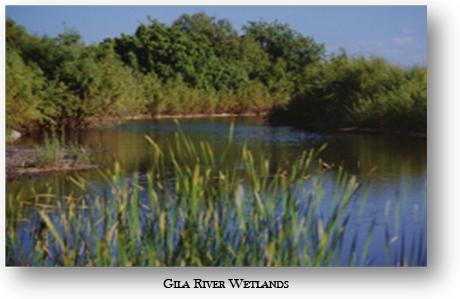SURFACE WATER/WATERSHED PROTECTION
GENERAL OVERVIEW
Community surface waters consist of rivers, washes, floodways, and wetlands. The DEQ-WQP is responsible for ensuring surface waters meet their designated beneficial uses which is assessed by the draft water quality standards.
SURFACE WATER AND WATERSHED QUALITY MONITORING
The DEQ-WQP is responsible for implementing surface water quality monitoring programs. Staff collect water quality data to assess the chemical, biological, and physical integrity of the Community’s surface waters. The general purposes of the monitoring program are to:
- Collect data to determine current water quality conditions;
- Provide data to support water quality assessments;
- Determine compliance with applicable surface water quality standards;
- Provide data to support the development of new or revised water quality standards;
- Listing impaired surface waters not meeting water quality standards;
- Developing water quality improvement plans; and
- Supporting, reviewing, and suggesting revisions to the water quality standards.
A surface water is deemed to have impaired water quality if the chemical, biological, or physical integrity of the water does not meet one of the surface water's intended uses. Once a surface water is deemed to be impaired, an intensive survey of pollutants and sources in the watershed is conducted.
OVERSEEING DISCHARGES TO SURFACE WATER
The DEQ-WQP monitors point source discharges on and off-Community lands to assure compliance and compatibility with applicable state and federal laws and permits. Our program reviews and comments on federal and state issued National Pollutant Discharge Elimination System (NPDES) permits that may impact Community water resources. We also monitor urban stormwater quality that enters the Community, which is considered a regulated point discharge under the federal Clean Water Act.
The DEQ-WQP also works with the US EPA on the implementation of the CWA §401 certification program. Section 401 of the federal Clean Water Act requires certification for any permit or license issued by a federal agency for an activity that may result in a discharge into waters of the U.S. This requirement allows each state or tribe to have input into federally approved projects that may affect its waters (rivers, streams, lakes, and wetlands) and to ensure the projects will comply with water quality standards and any other water quality requirements. Until the Community receives approval to administer the 401 certification program, EPA Region 9 reviews all applications and issues certifications.

